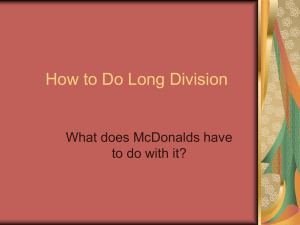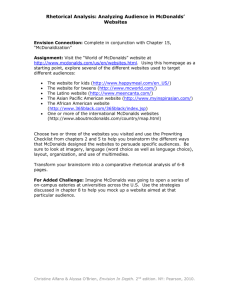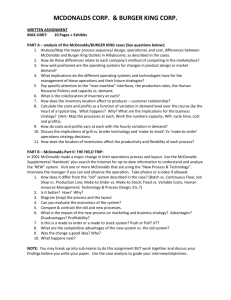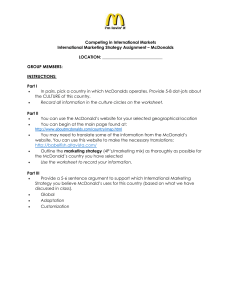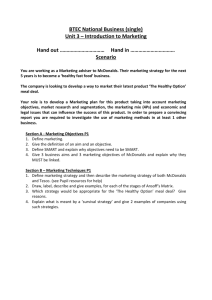McTheories and McFallacies
advertisement
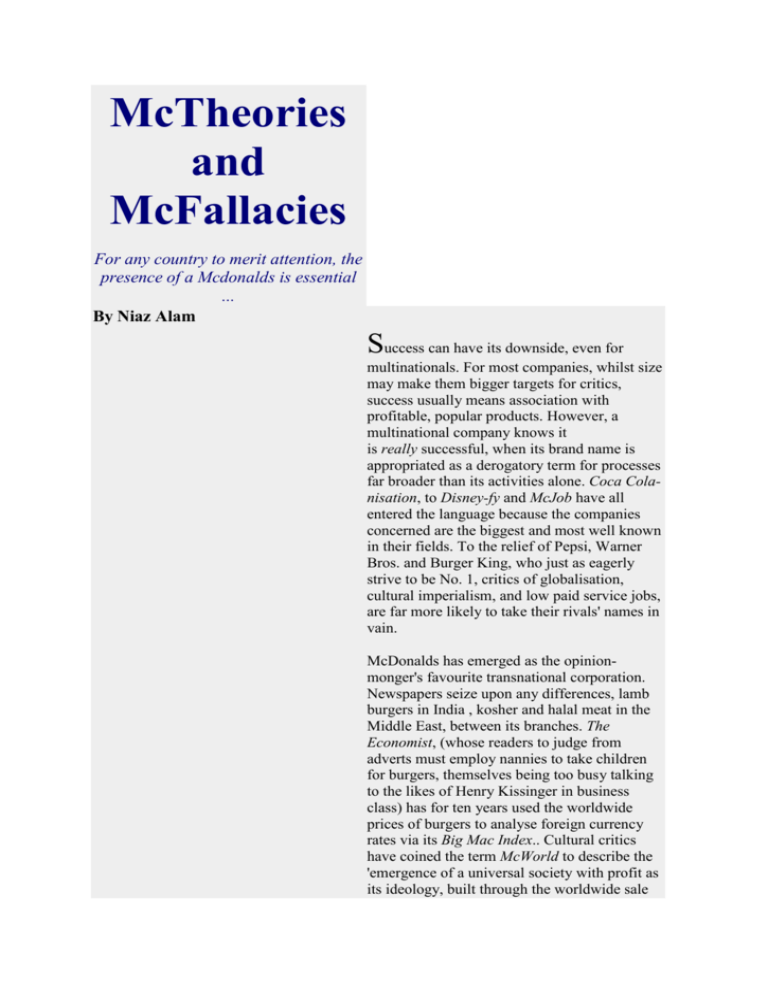
McTheories and McFallacies For any country to merit attention, the presence of a Mcdonalds is essential ... By Niaz Alam Success can have its downside, even for multinationals. For most companies, whilst size may make them bigger targets for critics, success usually means association with profitable, popular products. However, a multinational company knows it is really successful, when its brand name is appropriated as a derogatory term for processes far broader than its activities alone. Coca Colanisation, to Disney-fy and McJob have all entered the language because the companies concerned are the biggest and most well known in their fields. To the relief of Pepsi, Warner Bros. and Burger King, who just as eagerly strive to be No. 1, critics of globalisation, cultural imperialism, and low paid service jobs, are far more likely to take their rivals' names in vain. McDonalds has emerged as the opinionmonger's favourite transnational corporation. Newspapers seize upon any differences, lamb burgers in India , kosher and halal meat in the Middle East, between its branches. The Economist, (whose readers to judge from adverts must employ nannies to take children for burgers, themselves being too busy talking to the likes of Henry Kissinger in business class) has for ten years used the worldwide prices of burgers to analyse foreign currency rates via its Big Mac Index.. Cultural critics have coined the term McWorld to describe the 'emergence of a universal society with profit as its ideology, built through the worldwide sale of instantly recognisable branded commodities.' The list goes on. The landmark McLibel case, which took over a record two years just to hear, arose out of a leaflet originally published in London by a small collective in the mid 80s, listing environmental, political and nutritional criticisms of the company's operations. Against all odds, with no legal aid or professional representation, two of the publishers, David Morris and Helen Steel valiantly defended themselves against the company's legal onslaught, and called some 180 expert witnesses to support their case. The incredible story of how two otherwise ordinary people developed to challenge all the resources of a $30 billion corporation, is now the subject of a fascinating book by John Vidal. (1) For the moment though, my favourite McStory is the thesis claimed by foreign policy writer Thomas Friedman in the New York Times, reprinted in the Guardian last December, that no country with a McDonalds has gone to war with another that also has McDonalds branches. As the company recently extended its chain to its 100th and 101st countries, Belarus and Tahiti, this could be good news even to vegetarians. The idea is that when a country is able to support McDonalds branches, this is proof that it is "advanced enough to have been integrated into the global economy and the more closely nations are linked in this way, the more they seek economic and political stability." Though I suspect the thesis was partly cooked up to create 'Nobel Peace Fries' type headlines, it has been taken up at least semi-seriously by many writers because if civil wars are discounted, the basic fact on which it is based is true for now, e.g. Argentina didn't get a McDonalds till after the Falklands war. Israel and Egypt have only had branches in the past ten years etc.. Needless to say, the reasoning doesn't hold up to any more detailed examination, though far from ignoring it, liberal proponents of globalisation such as Francis Fukuyama have seized on the theory and associated developments to argue that 'globalisation is good, its spread is illustrated by the spread of (brand names like) McDonalds, and so the spread of McDonalds and/or globalisation is good and anyone who objects to either is bad.' None of them ever question their dogmatic faith in globalisation even where they acknowledge that as this particular corporation has only seriously ventured beyond the members of NATO in the past decade, it may simply be a matter of time before this particular theory is disproved. This unfortunate fact becomes more apparent when you note that many new 'McDonalds nations' in the Middle East and South East Asia, are key customers of the huge defence industries of the West. Even more obvious is that when the same product is junk food in some countries and marketed as a status symbol in others, the latter countries are much poorer than the former and it is untrue to say their populations equally benefit from globalisation. As Orwell pointed out though, some theories are so preposterous that only intellectuals believe them, and will say anything to justify themselves. Far from being disappointed were "two McDonalds countries to go to war," supporters of the thesis have argued that if this were to happen it would simply prove that one of the countries was not 'advanced enough' to have been worthy of a McDonalds branch in the first place! Opponents of globalisation who see unrestricted market forces as cover for entrenching trade systems in favour of the rich or worse, have long pointed out that the rich are far keener (and able) to impose market forces on the poor, while resisting pure free trade where it acts against their own interests. Such critics argue that supporters of globalisation are at least tolerant of, if not comfortable with, Northern domination of the planet. Taking some of this thinking to its logical conclusion the Sunday Telegraph, not normally a bastion of Chomsky style analysis, observed that "Those outside the McDonalds family are dealt with ruthlessly, most noticeably by the United States. Vietnam, Iraq, Cambodia and Somalia are all Big Mac free zones. The great diplomatic question for the 21st century may be how to deal with countries which, although they have achieved a seat in the UN General Assembly, are not "advanced" enough to warrant a McDonalds..." On one level I wish I was making these quotes up, as it is depressing to see so much brainpower diverted by these types of theory, which clearly originate simply to fill space in newspapers. On another though, I find them reassuring. These commentators are among the cream of defenders of old economics. If they have to spend their time coming up with thoughts like "people in McDonald's countries don't like to fight wars. They like to wait in line for burgers," it can't be that hard to turn the tables on them! "Counter culture vs. Burger culture" by John Vidal, published by Macmillan £15.99, pp324. This is a longer version of an article first published in New Economics Magazine. Issue 42. Summer 1997. Vine Court, 112116, Whitechapel Rd. London E11JE. Our thanks to the author - Ed.
